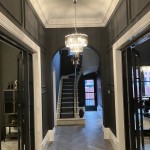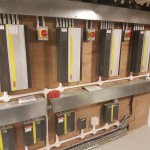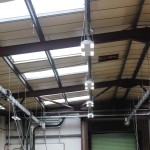Choosing an Electrical Contractor
Why is it important to choose the right electrical contractor? This guide has been written to answer that very question and hopefully allow you the customer to make the correct choice.
Electrical installations should be safe to protect you and your family from harm, but they should also add value to your property. They should always be practical, but also enhance the ambience of any room by providing good quality lighting. Modern properties require a myriad of electrical related services, lighting, power, security systems, CCTV, aerial systems, access control, life safety systems and audio visual systems to name a few. These systems need considerable thought and planning to ensure they meet the customer expectations and should be considered well in advance of the project start date.
You should have complete faith in your electrical contractor and trust his advice and judgement. A customer should never feel pressurised into accepting a single choice option to any light fitting or electrical accessory offered by the electrician and should be able to make choices after a selection of samples have been demonstrated. An electrical contractor should provide a great deal of patience and understanding, after all this could be the first time a customer has undertaken this type of project. Having a friendly and approachable attitude is critical, so the customer can feel relaxed and comfortable to discuss project or design changes with their chosen electrical contractor with ease.
Finding Your Electrical Contractor
Recommendation is always the best way to find a good electrical contractor. Ask family and friends if they have had dealings with any electrical companies and gauge their feedback using the points raised in this guide.
If you are unable to find an electrical contractor through recommendation, the next best place to look is on a trade association website, such as the NICEIC. The NICEIC is a consumer organisation set up to promote electrical safety. Their members undergo rigorous inspection to ensure they adhere to strict rules of membership and meet the requirement of BS7671 (the regulations that govern electrical installations).
Meeting and Dealing with Your Electrical Contractor
Your electrical contractor should arrange to meet with you at the project to thoroughly discuss your electrical requirements. This meeting should be arranged at a mutually convenient time, but not when it is best to suit the contractor. During the initial meeting, the customer will need to convey to the contractor what work they require, giving as much information as possible to allow an accurate quotation to be formulated. This meeting should take as long as the customer needs and the contractor should offer guidance and advice on different solutions to meet the goals of the client.
Find out if your electrical contractor is experienced in the type of work you are asking them to undertake. Have they done similar projects to yours and are they able to give you references from previous customers? Can they offer you a turnkey solution and provide all elements of the electrical installation such as security alarms, television aerial, data, audio visual systems etc? If not, do you really wish to manage all this separate specialist trades yourself?
A written quotation should be sent to the customer detailing exactly what works are to be carried out and for how much. This quotation should arrive within seven days of the initial meeting. The quotation should detail any items that potentially may be subject to variation and additional cost to allow the customer to fully understand any possible price increases that may occur. The quotation must also state how long the job will take, the period of time it is open to acceptance and when they could start the works.
Before Orders are placed with Your Electrical Contractor
When you have decided on your electrical contractor, ask them to put in writing exactly what services they are providing for you. The start and completion date, the contract duration, payment terms and any associated paper work (i.e. test certificates etc.) they will provide that will form part of the order. As a minimum, all projects should receive drawings detailing the location and quantity of electrical light fittings, switches, power points and any other specialist items. These drawing do not need to be architect quality and can be hand drawn on top of the site plans. Larger more complex projects should have full AutoCAD plans. All projects should have an electrical completion certificate and a Part P competence person Building Regulation Certificate.
A dedicated project manager should look after the installation and you should be able to contact them during office hours to discuss any aspect of the works. Should they be busy with other customers, they should promise you a call back within four hours.
Find out what guarantee your electrical contractors offers and how quickly they will return to site if a fault arises. Urgent faults should be rectified within 24 hours; non urgent faults should be rectified within seven days.
Your electrical contractor should protect your property while works are being carried out. Dust sheets should be provided to protect furniture and floor coverings. Modern plastic film roll protection is ideal for hard surfaces.
Once your contractor has confirmed in writing exactly the services they are providing for you, this can form the basis of a simple contract that can be signed by both parties.
Once the Order is Placed
Your electrical contractor should provide a set of draft plans for you to look at before works commence on site for approval and sign off. These plans should be issued in a timely manner to allow the customer time to go over and make any changes required. A good electrical contractor will be willing to sit down with you and discuss the proposals in detail and help you to understand exactly how the finished installation will turn out. If any changes are made, they should reissue plans for customer approval and sign off.
You may need help planning a lighting design, your contractor should have experience in this area of expertise and be willing to offer advice free of charge.
During the Works
Your electrical contractor will probably need to work closely with other trades to progress the works efficiently and affectively. They will need to make contact with the other trades, in particular the main contractor to establish a full programme of works for the project. Delays regularly occur on projects due to poor communication between trades and often lead to disputes if not managed correctly. Ensure your contractor is willing to be proactive in this essential area of the build process.
The electrical contractor will need a steady stream of guidance from you as the project progresses, for example, exact locations of sockets in relation furniture layouts. Your contractor should ask for this information in a timely manner to ensure you are not rushed into making rash
decisions.
It is inevitable that things on the project will change as it evolves. Changes should be dealt with in a professional manner and any associated costs reported to the customer promptly. If changes are complex and require several permutations, budget costs should be delivered to the customers
until a clear direction is established.
On larger projects, monthly financial statements should be issued detailing any variations and the projected final account.
The electrical contractor should be clean and tidy throughout the project and clear the site of any mess they have made at the end of each working day.
After the Works are Completed
Once the electrical installation is complete the electrical contractor should carry out a full test and inspection using calibrated test equipment. When the contractor is satisfied with the results obtained, they will issue a completion certificate that provides details of the installation, together
with all test results obtained. This is an important document and should be retained as it will be required if you decide to sell your property.
Also you should receive in the post, a Part P Building Regulation compliance certificate from an organisation such as the NICEIC. This certificate is generated by the electrical contractor through the NICEIC notification website and should also be retained.
The electrical contractor should hand over any operating instructions for equipment installed forming part of the electrical installation and instruct you on its use. They should also offer telephone support for the lifetime of the installation.
Conclusions and Summary
We hope you have found this guide useful and informative. Any feedback you have would be most welcome and will assist us with future amendments we make to this guide.
In summary, your electrical contractor as a minimum should be able to offer you the following:
- Proven experience in the type of works you are asking them to undertake
- Written quotations detailing exactly what services they will provide for you, how long it will take and the exact cost. Also, make you aware of any other potential costs that may arise, for example a new consumer unit to meet current regulations
- Trade association membership of a competence person scheme that allows them to issue Part P compliant Building Regulation Certificates
- Willing to meet with you to help you design and plan your electrical installation. Offer expert advice during the planning phase of the project
- Provide drawings detailing the electrical works before it commences for approval and sign off
- Tell you how they will protect you property during the electrical installation work
- Provided you with a schedule detailing their payment terms
- Provide you with an electrical completion certificate and confirm how long after the project is completed you will you receive it
- Offer you a minimum twelve month guarantee period and rectify any major faults within 24 hours and minor faults within seven days
Breese and Earle Electrical Services Ltd can confidently say they meet all the questions raised within this guide and are happy to discuss any of your electrical needs, please give our friendly team a call on 01527 503 222.




